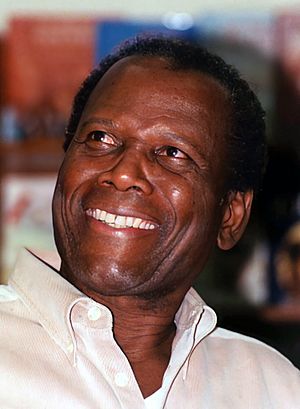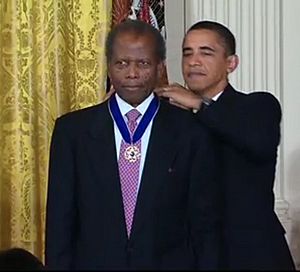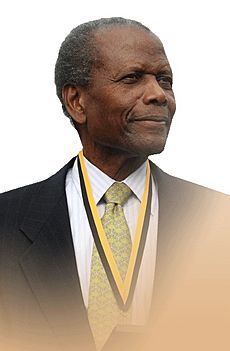Sidney Poitier facts for kids
Quick facts for kids
Sidney Poitier
|
|
|---|---|
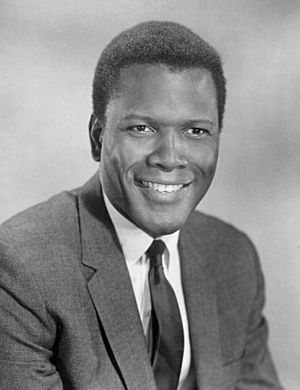
Poitier in 1968
|
|
| Born | February 20, 1927 Miami, Florida, U.S.
|
| Died | January 6, 2022 (aged 94) |
| Nationality |
|
| Occupation |
|
| Years active | 1946–2009 |
|
Works
|
Full list |
| Spouse(s) |
Juanita Hardy
(m. 1950; div. 1965)Joanna Shimkus
(m. 1976) |
| Partner(s) | Diahann Carroll (1959–1968) |
| Children | 6, including Sydney Tamiia |
| Awards | Full list |
| Ambassador of the Bahamas | |
| 1997–2007 | Ambassador to Japan |
| 2002–2007 | Ambassador to UNESCO |
| Military career | |
| Service/ |
United States Army |
| Years of service | 1943–1944 |
| Battles/wars | World War II |
Sidney Poitier KBE ( pwah-tyay; February 20, 1927 – January 6, 2022) was a Bahamian and American actor, film director, and diplomat. In 1964, he was the first black actor and first Bahamian to win the Academy Award for Best Actor. He received two competitive Golden Globe Awards, a competitive British Academy of Film and Television Arts award (BAFTA), and a Grammy Award for Best Spoken Word Album. Poitier was one of the last major stars from the Golden Age of Hollywood cinema.
Contents
Early life
Sidney Poitier was born on February 20, 1927, in Miami, Florida. He was the youngest of seven children born to Evelyn (née Outten) and Reginald James Poitier, Afro-Bahamian farmers who owned a farm on Cat Island. The family would travel to Miami to sell tomatoes and other produce to wholesalers. His father also worked as a cab driver in Nassau. Poitier was born unexpectedly in Miami while his parents were there on business; his birth was two months premature, and he was not expected to survive, but his parents remained in Miami for three months to nurse him to health.
Poitier grew up in the Bahamas, then a British Crown colony. His birth in the United States entitled him to US citizenship.
Poitier lived with his family on Cat Island until he was ten, when they moved to Nassau. There he was exposed to the modern world, where he saw his first automobile and first experienced electricity, plumbing, refrigeration, and motion pictures.
At age fifteen, he was sent to Miami to live with his brother's large family, but Poitier found it impossible to adjust to the racism in Jim Crow era Florida. At sixteen, he moved to New York City, looking to become an actor, holding a string of jobs as a dishwasher in the meantime. After failing his first audition with the American Negro Theatre due to his inability to fluently read the script, an elderly Jewish waiter sat with him every night for several weeks, helping him to improve his reading by using the newspaper.
In the Army
During World War II, in November 1943, he lied about his age and enlisted in the Army. He was assigned to a Veteran's Administration hospital in Northport, New York, and was trained to work with psychiatric patients. Poitier became upset with how the hospital treated its patients and feigned mental illness to obtain a discharge under Section VIII of Army regulation 615–360, which was granted in December 1944.
After leaving the Army, he worked as a dishwasher until a successful audition landed him a role in an American Negro Theatre production, the same company he failed his first audition with.
Career highlights
He joined the American Negro Theatre but was rejected by audiences. Determined to refine his acting skills and rid himself of his noticeable Bahamian accent, he spent the next six months dedicating himself to achieving theatrical success. On his second attempt at the theater, he was noticed and given a leading role in the Broadway production of Lysistrata, through which, though it ran a failing four days, he received an invitation to understudy for Anna Lucasta.
He landed his breakthrough film role as a high school student in the film Blackboard Jungle (1955). In 1958, Poitier starred with Tony Curtis as chained-together escaped convicts in The Defiant Ones, which received nine Academy Award nominations; both actors received nominations for Best Actor, with Poitier's being the first for a Black actor. They both also had Best Actor nominations for the BAFTAs, with Poitier winning. Additionally Poitier won the Silver Bear for Best Actor for his performance in the film.
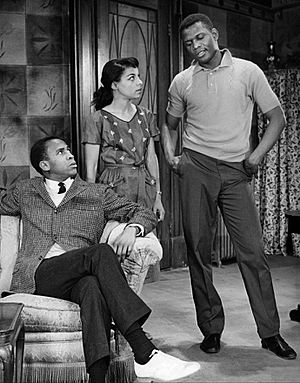
In 1964, he won the Academy Award and the Golden Globe for Best Actor for Lilies of the Field (1963), playing an itinerant handyman helping a group of German-speaking nuns build a chapel.
Poitier also received acclaim for Porgy and Bess (1959), A Raisin in the Sun (1961), and A Patch of Blue (1965), because of his strong roles as epic African American male characters. He continued to break ground in three successful 1967 films which dealt with issues of race and race relations: To Sir, with Love; Guess Who's Coming to Dinner, and In the Heat of the Night, the latter of which won the Academy Award for Best Picture for that year. He received Golden Globe and BAFTA nominations for his performance in the last film, and in a poll the next year he was voted the US's top box-office star.
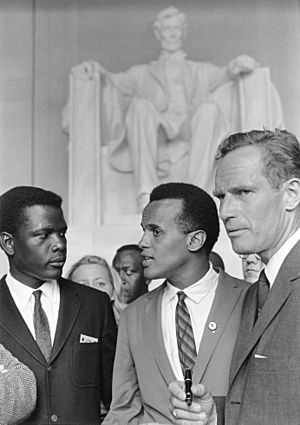
Beginning in the 1970s, Poitier also directed various comedy films, including Stir Crazy (1980), starring Richard Pryor and Gene Wilder, among other films. After nearly a decade away from acting, he returned to television and film starring in Shoot to Kill (1988) and Sneakers (1992).
With the death of Ernest Borgnine in 2012, Poitier became the oldest living recipient of the Academy Award for Best Actor. On March 2, 2014, Poitier appeared with Angelina Jolie at the 86th Academy Awards to present the Best Director Award. He was given a standing ovation and Jolie thanked him for all his Hollywood contributions, stating: "We are in your debt." Poitier gave a brief speech, telling his peers to "keep up the wonderful work" to warm applause. In 2021, the academy dedicated the lobby of the new Academy Museum of Motion Pictures in Los Angeles as the "Sidney Poitier Grand Lobby" in his honor.
Personal life

Poitier was first married to Juanita Hardy from April 29, 1950, until 1965. Though Poitier became a resident of Mount Vernon in Westchester County, New York in 1956, they raised their family in Stuyvesant, New York, in a house on the Hudson River.
He married Joanna Shimkus, a Canadian actress who starred with Poitier in The Lost Man in 1969, on January 23, 1976, and they remained married until his death.
He had four daughters with his first wife (Beverly, Pamela, Sherri, and Gina) and two with his second (Anika and Sydney Tamiia). In addition to his six daughters, Poitier had eight grandchildren and three great-grandchildren. When Hurricane Dorian hit the Bahamas in September 2019, Poitier's family had 23 missing relatives.
Death
On January 6, 2022, Poitier died at his home in Beverly Hills, California, at the age of 94.
Upon Poitier's death, many released statements honoring him, including Joe Biden, Barack Obama, Michelle Obama, Bill Clinton and Hillary Clinton.
Many in the entertainment industry also paid tribute to Poitier. Broadway paid tribute when its theaters dimmed their lights on January 19, 2022, at 7:45 pm ET.
The Ebertfest film festival announced it would be dedicating their 2022 event to the memory of Poitier and Gilbert Gottfried.
Interesting facts about Sidney Poitier
- Poitier's family lived in the Bahamas, but he was born unexpectedly in Miami, Florida, while they were visiting, which automatically granted him U.S. citizenship.
- He was raised Catholic but later became an agnostic with views closer to deism.
- Unlike many black actors at the time, Poitier was unable to sing because of his tone deafness.
- Poitier modeled his legendary speech pattern after radio personality Norman Brokenshire.
- In 1947, Poitier was a founding member of the Committee for the Negro in the Arts (CNA), an organization whose participants were committed to a left-wing analysis of class and racial exploitation. His participation in CNA led to his subsequent blacklisting for a few years.
- From 1995 to 2003, Poitier served as a member of the board of directors of The Walt Disney Company.
- In April 1997, Poitier was appointed ambassador from the Bahamas to Japan, a position he held until 2007.
- From 2002 to 2007, he was concurrently the ambassador of the Bahamas to UNESCO.
- Sidney, a documentary film about Poitier's life and legacy by Reginald Hudlin, was released on September 23, 2022.
- Poitier became the first Black actor to win the Academy Award for Best Actor for Lilies of the Field (1963).
Sidney Poitier quotes
- "So much of life, it seems to me, is determined by pure randomness."
- "I learned to hear silence. That's the kind of life I lived: simple. I learned to see things in people around me, in my mom, dad, brothers and sisters."
- "If I'm remembered for having done a few good things, and if my presence here has sparked some good energies, that's plenty."
- "I never had an occasion to question color, therefore, I only saw myself as what I was... a human being."
Awards and honours
- Poitier was granted a knighthood by Queen Elizabeth II in 1974.
- In 1982, he received the Golden Globe Cecil B. DeMille Award.
- In 1986, he gave the Commencement Address to the University of Miami graduating class and was given the Honorary Degree of Doctor of Fine Arts.
- In 1994, Poitier received a star on the Hollywood Walk of Fame.
- In 1995, he received the Kennedy Center Honor.
- In 1999, he ranked 22nd among male actors on the "100 Years...100 Stars" list by the American Film Institute and received the Screen Actors Guild Life Achievement Award.
- In 2002, he was given an Honorary Academy Award, in recognition of his "remarkable accomplishments as an artist and as a human being".
- In 2009, he was awarded the Presidential Medal of Freedom, the highest civilian honor in the United States, by President Barack Obama.
- In 2016, he was awarded the BAFTA Fellowship for outstanding lifetime achievement in film.
Works about Poitier
Autobiographies Poitier wrote three autobiographical books:
- This Life (1980)
- The Measure of a Man: A Spiritual Autobiography (2000)
- Life Beyond Measure: Letters to My Great-Granddaughter (2008, an Oprah's Book Club selection)
Biographies
- Sidney Poitier: Man, Actor, Icon (2004) by historian Aram Goudsouzian.
- Sidney Poitier Black and White: Sidney Poitier's Emergence in the 1960s as a Black Icon (2020) by Philip Powers.
Other works
Poitier wrote the novel Montaro Caine (2013).
Documentaries
- Sidney Poitier, un outsider à Hollywood (2008)
- Sidney (2022)
See also
 In Spanish: Sidney Poitier para niños
In Spanish: Sidney Poitier para niños
- David Hampton, an impostor who posed as Poitier's son "David" in 1983, which inspired the 1990 play and 1993 film Six Degrees of Separation
- John Stewart, a superhero whose original design was based on Poitier


